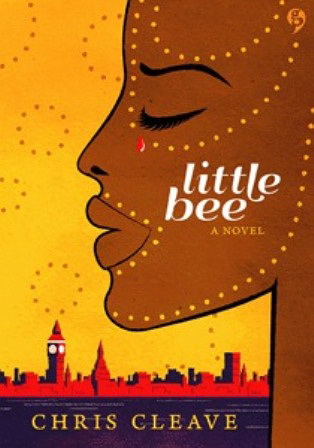
There is no such a thing as “black and white”, there is only gray. The idea is clearly displayed in Chris Cleave’s upsetting novel, Little Bee. Set and first published in this modern, conflicting era, the book showcases how Cleave cleverly builds a situation seen from two different points of view where selfishness of those who are involved seems to be the core of everything. It doesn’t have any protagonists, nor does it have a certain antagonist. It only has selfish people, with layers of character that cannot be defined as good or evil.
Little Bee, a sixteen-year-old Nigerian girl, illegally leaves her native country and sets foot in England. Her aim is to escape the prevailing oilfield conflict there and the men who want to kill her for her knowledge of what they do. Once in the heart of London, and after going through such a long predicament, she tries to find a man named Andrew, someone she knows back when he comes to Nigeria for a second honeymoon. But there is something unexplained between them that drives Andrew to commit suicide, something that Sarah Summers, his wife, doesn’t even realize. Sarah is never happy with their marriage, not even before their son, Charlie, is born. One day, in the middle of doing her job, she meets Lawrence, a married man working for the Home Office, and a sudden burst of lust drags them mercilessly into a passionate secret love affair. Their relationship doesn’t last long, however, for Andrew gets a whiff of it and goes into outrage. Though she doesn’t love Andrew enough to do it, Sarah feels compelled to get their marriage back on track. And so she plans their second honeymoon and they fly all the way to Nigeria, a country harshly hit by a conflict over an oilfield. There, they meet Little Bee and her sister, who ask for help but never get it.
Cleave deliberately puts a hole in every character he creates for this book, so they all look sinful and guilty. But they also have some good qualities, which make them pure human in every aspect. Cleave lets the reader see Andrew as a faithful husband, but he is streaked with self-centeredness and it’s proven in how he’s unwilling to help Little Bee. Sarah might be a dishonest, cheating woman, but at least she still has compassion to help those in need. And even Little Bee, the one who deserves our pity most, has a heart to let Andrew hang to die in the air, and it’s all because she bears a grudge against him. All these natural characters are what form the entire story into an effortlessly lucid narrative, vividly presenting a conflict as it is seen and the unsolved end following it. In short, a conflict exist at the hands of selfish, flawed, imperfect people who only think about themselves, and that’s what always happens in reality. All those characters we find in Little Bee are only tiny specks of examples of real people out there outside the fictional world.
I don’ t think Little Bee is a form of a richly complicated narrative, for, as I read it, it was quite easy to follow and seemed so simple. But Chris Cleave has brilliantly written it from the viewpoints of two different women of two different worlds with two different characters and choices of life. The first part of the book, if I may say so, reveals the story from the way Little Bee sees it, and the second part tells it from Sarah’s perspective. Cleave doesn’t seem to want to make a comparison of the two, he just wants to explain the cause of the problem and its result in reverse order. The plot is quite enjoyable, and some parts are annoyingly tickling. I’d say that Little Bee has, in addition to a very brilliant basic idea, a pretty unique way of storytelling and an unusual storyline. The characters are also marvelously described, by way of what they do and what they say. They are not written in detail somehow, but everything presented about them is already enough to create a picture in the reader’s mind. And their presence in the story can be said to be the tool of delivering the main issue Cleave wants the reader to see, which is conscience, clear or not. Most of the times, people do not have compassion enough to help others and do the right thing, but once they let their ego overwhelm them, their conscience troubles them with no mercy.
Overall, I can say that Little Bee is a great work of fiction in every aspect. Complicated but easy to devour, upsetting but wondrous at the same time. Since I read the translated edition, that’s the barrier I had in enjoying the book totally, the translation.
Rating: 3.5/5